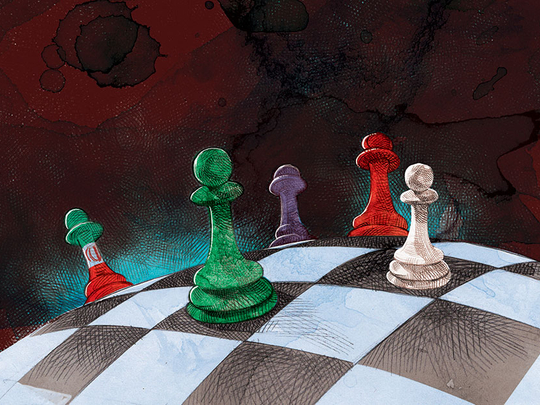
As the battle for Tikrit, 140 kilometres northwest of Baghdad, rages on to wrest the city and the governorate of Salah Al Deen from Daesh (self-proclaimed Islamic State of Iraq and the Levant), there are fresh warnings that Iran is stretching its authority over Iraq. Reports speak of hundreds of Iranian military advisors on the ground leading the Shiite militias, who make up more than two thirds of the Iraqi force battling Daesh. Head of Al Quds Brigade, an extension of Iran’s Revolutionary Guard, General Qasim Sulaimani is said to be orchestrating operations, while Iraq’s Defence Minister Khalid Al Obedi has admitted that his country “is comfortable asking for and receiving help from Iran”.
Heads of Sunni tribes in Iraq have expressed concern over the role of Shiite militias, accusing some of carrying out sectarian reprisals against local residents in liberated areas. Those militias will form the base of an Iranian military presence in Iraq. Others have warned that the war against Daesh will culminate in a full Iranian takeover of Iraq. The same sentiments were expressed by Saudi Foreign Minister Saudi Al Faisal last week during a joint press conference with his American counterpart, John Kerry.
It is no secret that Saudi Arabia is suspicious of any deal reached between Tehran and the international community over the former’s nuclear programme. The feeling in Riyadh is that such a deal will boost Iran’s regional presence, which has extended into Yemen, Iraq, Syria and Lebanon. Fears of a sectarian faceoff are said to have prompted King Salman Bin Abdul Aziz to strengthen ties with Ankara in an attempt to build a coalition to ward off Iranian expansion. Worries about an Iranian hegemony over the region were heightened when an advisor to President Hassan Rouhani and former head of intelligence, Ali Yunisi, said this week that “Iran has become an empire with Baghdad as its capital”. Other Iranian officials have said that Iran was the only country fighting Daesh on the ground and that without its intervention both Baghdad and Irbil would have fallen.
The audacity of the Iranian project in the region has presented key Arab players with a difficult choice. The defeat of Daesh in Iraq will lead to a Shiite resurgence spearheaded by Tehran at the expense of the country’s Sunnis. US officials appear to share that view as well. US Chairman of the Joint Chiefs-of-Staff General Martin Dempsey has warned against the breakout of sectarian confrontations once the Iranian-backed operation to dislodge Daesh from the city of Tikrit is over.
For now, US priority in Iraq is focused on defeating Daesh. But as US President Barack Obama insists that there will be no American boots on the ground — except for the 2,500 military advisors training the Iraqi army — the US administration is becoming ambivalent about Iran’s increasing influence over Baghdad. Warnings by Dempsey, US Defence Secretary Ash Carter and former members of the intelligence community are unlikely to change the current mood in the White House.
The defeat of Daesh in Tikrit will pave the way for the next big battle in Mosul. Residents have complained of sectarian reprisals by militias and of being prevented from returning to their homes. Such acts will add to hostilities between the two sects and are likely to drive Sunnis to extremism. It was such policies, under former prime minister Nouri Al Maliki, that drove many Iraqi Sunnis to embrace Daesh. While Iranian influence in Iraq is likely to grow in the coming months, so will the chances for the eruption of civil strife that could tear the country apart.
Despite attempts to overcome differences, relations between most Arab countries and Iran are engulfed by doubts and uncertainties. This prompted Jordan, last week, to dispatch its foreign minister to Tehran with a message from King Abdullah, calling for an Arab-Iranian dialogue. Jordan is a close ally of Saudi Arabia and most Gulf states and it is likely that the Jordanian move was taken in coordination with its allies.
In the absence of a proactive US role to check Iran’s regional expansion — some claim that Washington is colluding with Tehran — Arab countries that worry about Tehran’s rising influence are running out of options. Initiating dialogue may open new tracks, but it is not certain that it will persuade Tehran to change its policy on Iraq, Syria or Yemen. There is still a divergence of opinions in the Arab camp on how best to deal with the four-year-old Syrian crisis. The Arab side has been unable to help Yemen in its latest crisis, which has become a major challenge for the Gulf states.
The 2003 invasion of Iraq has tipped the geopolitical balance in Iran’s favour. Tehran has been able to expand its influence in Iraq at the expense of Baghdad’s Arab neighbours. Today it openly supports the regime of Bashar Al Assad in Syria and is interfering directly in the affairs of Yemen. Banking on US intervention to reverse Iranian gains is not an option. Short of a new strategy to confront Iran’s regional ambitions, the Arab side will be on the retreat for some time to come.
Osama Al Sharif is a journalist and political commentator based in Amman.







